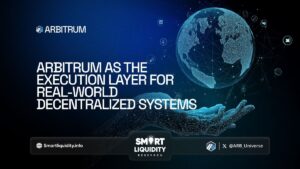Which Layer 2 Solution is Leading the Race? A Closer Look at Arbitrum and zk-Rollups


Which Layer 2 Solution is Leading the Race? A Closer Look at Arbitrum and zk-Rollups! In the fast-paced world of blockchain and decentralized applications (dApps), scalability is one of the most pressing concerns. As Ethereum continues to grow as the go-to network for dApp developers, the need for solutions that address its scalability limitations has become crucial.
Two key technologies are competing in this arena: Arbitrum and zk-Rollups. Both are Layer 2 solutions that promise to alleviate congestion on Ethereum, reduce gas fees, and improve transaction throughput. But which one is truly leading the race?
Understanding Layer 2 Solutions
Layer 2 solutions are protocols that operate on top of existing blockchains, improving their scalability without compromising security. These solutions aim to handle transactions off the main Ethereum chain, aggregating them before sending the final results back to the main network. By doing this, they help alleviate congestion on the Ethereum network while ensuring faster and cheaper transactions.
The most prominent Layer 2 technologies in the race today are Optimistic Rollups (with Arbitrum as a leader) and zk-Rollups (Zero-Knowledge Rollups). These two have emerged as viable solutions to Ethereum’s scalability issues, but they take very different approaches to solve the same problem.
Arbitrum: The Optimistic Rollup Leader
Arbitrum has positioned itself as one of the most promising Optimistic Rollup solutions. It works by assuming that all transactions are valid by default (hence the term “optimistic”). Validators only intervene when there is a dispute, in which case they check the transaction. This design allows Arbitrum to process a high volume of transactions quickly, with less computational overhead.
Since its mainnet launch, Arbitrum has gained significant traction. Its Arbitrum One network has been widely adopted by developers looking for scalable Ethereum solutions.
Arbitrum provides several advantages, such as:
- EVM compatibility
Arbitrum is fully compatible with the Ethereum Virtual Machine (EVM), meaning that developers can seamlessly port their existing dApps to Arbitrum without major code changes. - Faster confirmation times
Users experience much faster transaction speeds compared to the congested Ethereum mainnet. - Lower transaction costs
By processing transactions off-chain and only posting summaries on Ethereum, Arbitrum dramatically reduces gas fees.
zk-Rollups: A Zero-Knowledge Powerhouse
On the other side of the race, zk-Rollups are gaining momentum. Zero-Knowledge Rollups operate on a different principle—rather than assuming transactions are valid (as Optimistic Rollups do), zk-Rollups use cryptographic proofs to verify the correctness of every transaction. These zero-knowledge proofs allow zk-Rollups to process large batches of transactions and ensure that they are valid without needing to verify each transaction individually on the Ethereum mainnet.
This approach provides zk-Rollups with several key advantages:
- Long-term scalability
The cryptographic nature of zk-Rollups makes them highly efficient in the long run, as they can handle increasing network demands without sacrificing security or decentralization. - Faster finality
zk-Rollups don’t rely on a dispute window like Optimistic Rollups, so transactions can be finalized almost immediately once the proof is generated. - Enhanced security
Because every transaction is verified using cryptographic proofs, zk-Rollups offer a higher degree of security compared to Optimistic Rollups.
Who is Leading the Race?
Both Arbitrum and zk-Rollups have their strengths, and each has been rapidly evolving. Arbitrum, being an Optimistic Rollup, has seen quicker adoption in the short term due to its relative simplicity and immediate benefits like faster transaction speeds and reduced costs. Many DeFi protocols have migrated or integrated with Arbitrum, contributing to its ecosystem’s rapid growth.
However, zk-Rollups are gaining ground, particularly due to their superior security and near-instant transaction finality. Projects like zkSync are pushing zk-Rollup technology forward, and many believe that zk-Rollups may become the dominant solution as the technology matures.
In Summary
The competition between Arbitrum and zk-Rollups is emblematic of the larger race to scale Ethereum effectively. While Arbitrum has taken an early lead in terms of adoption and developer support, zk-Rollups offers an incredibly promising alternative with potentially stronger long-term scalability and security. Ultimately, the solution that best balances speed, security, and ease of use will likely come out ahead.
As we look toward the future of Ethereum and decentralized finance (DeFi), both Arbitrum and zk-Rollups will play pivotal roles in shaping the next phase of blockchain scalability. The real question is: Which Layer 2 solution will claim the crown? Only time will tell.




